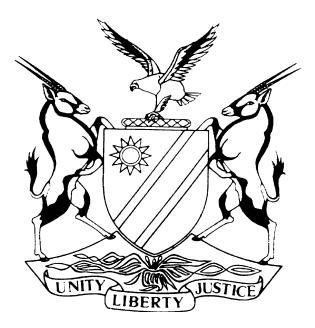R NOT REPORTABLE

HIGH COURT OF NAMIBIA MAIN DIVISION, WINDHOEK
JUDGMENT
Case no: CR: 76/2013
In the matter between:
THE STATE
and
RUBEN SHAMWANGE ACCUSED
(HIGH COURT MAIN DIVISION REVIEW REF NO. 1460/2013
Neutral citation: S v Shamwange (CR 76/2013) [2013] NAHCMD339(15 November 2013)
Coram: HOFF J and MILLER AJ
Delivered: 15 November 2013

ORDER

(a) The conviction and sentence are set aside.
(b) The magistrate is ordered to enter a plea of not guilty in respect of the main count.
(c) The magistrate must thereafter question the accused in respect of the alternative count.
(d) Should the accused admit all the allegations in respect of the alternative count and the State accepts that plea the accused may be convicted on the alternative charge.
(e) Should the State not accept the plea on the alternative charge the magistrate must then order the State to lead evidence in order to prove the main charge.

JUDGMENT

HOFF J (MILLER AJ concurring):
[1] The accused was charged with dealing in cannabis in contravention of the provisions of s 2(a) of Act 41 of 1971, alternatively being in possession of cannabis in contravention of s 2(b) of Act 41 of 1971 in the Otjiwarongo Magistrate’s Court. The accused pleaded guilty to both the main and alternative counts and was thereafter questioned by the presiding officer in terms of the provisions of s 112(1)(b) of Act 51 of 1977.
[2] The accused admitted being found in possession of 157,9 grams of cannabis but denied dealing in cannabis. The accused explained that he possessed the cannabis for his own use (to smoke it).
[3] At the end of the questioning the magistrate strangely asked the State prosecutor whether the State accepted the plea ‘on dealing in dependence producing substance’ to which the prosecutor replied in the affirmative. The accused was thereafter convicted in respect of the main count, namely dealing in cannabis.
[4] I requested the magistrate to provide me her reasons for convicting the accused of dealing in cannabis.
[5] The presiding officer replied that the accused was convicted on the presumption that where an accused was found in possession of more than 115 grams of cannabis such accused is presumed to have dealt in cannabis. The magistrate requested that the conviction and sentence be set aside and the matter be returned to her in order for the ‘accused to adduce evidence either himself testifying or witnesses to prove the contrary under oath, thereby the State will be given the opportunity to cross-examine the witnesses’.
[6] It is not quite clear to me what the learned magistrate meant by this quoted passage. It is trite law that there is no duty on an accused person to prove his or her innocence.
[7] The purpose of the questioning in terms of s 112(1)(b) is clear namely for the presiding officer to ascertain whether or not an accused person admits all the allegations in the charge sheet.
[8] The accused in this particular case categorically denied that he was dealing in cannabis. The magistrate by ignoring this denial committed a grave irregularity. A magistrate when questioning an accused person is not entitled to draw inferences from the answers provided neither, as in this instance, may the magistrate rely on a presumption where the accused was found in possession of more than 115 grams of cannabis and convict him of dealing in cannabis. This is also a grave irregularity.
[9] The onus is on the State to prove the commission of any crime beyond reasonable doubt, but where an accused pleaded guilty, as in the present instance, is then questioned by the presiding magistrate, denied an allegation in the charge sheet, then in terms of the provisions of s 113 of Act 51 of 1977 the court must enter a plea of not guilty and ask the State to lead evidence in order to prove the commission of the crime.
[10] In the present instance the magistrate should in respect of the main count have entered a plea of not guilty and then continued to question the accused in respect of the alternative count of possession of cannabis. If the accused had admitted all the allegations in respect of the alternative charge, the magistrate should then have asked the State whether it accepts the plea on the alternative charge or whether the State intended to prove the main count by leading evidence.
[11] At this stage I need to comment on the sentence imposed by the magistrate. The following sentence was imposed:
‘N$5 000.00 or 18 months imprisonment of which N$2 500.00 or 9 months imprisonment are suspended on usual conditions for 3 years.’
[12] This sentence in my view is irregular and incomplete. It is trite law that where a suspended sentence is imposed it must be clear to an accused person what the conditions of the suspended sentence are in order to avoid the suspended sentence be put into operation.
[13] Where a condition reads ‘on usual conditions’ would an accused person know what are the usual conditions? Certainly not. The accused person has the right to know what those conditions are and the conditions must be apparent from the record.
[14] In the result the following orders are made:
(a) The conviction and sentence are set aside.
(b) The magistrate is ordered to enter a plea of not guilty in respect of the main count.
(c) The magistrate must thereafter question the accused in respect of the alternative count.
(d) Should the accused admit all the allegations in respect of the alternative count and the State accepts that plea the accused may be convicted on the alternative charge.
(e) Should the State not accept the plea on the alternative charge the magistrate must then order the State to lead evidence in order to prove the main charge.
----------------------------------
E P B HOFF
Judge
----------------------------------
P J MILLER
Acting Judge